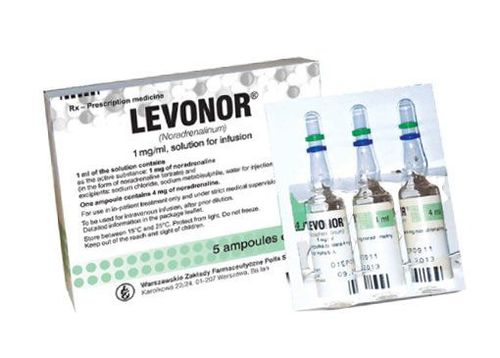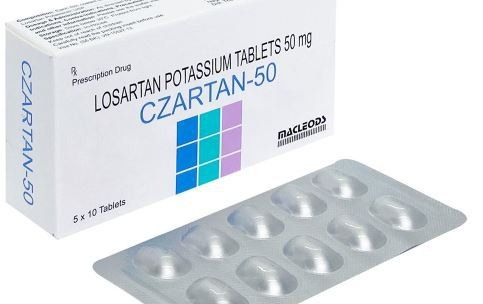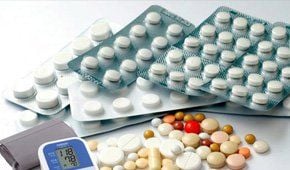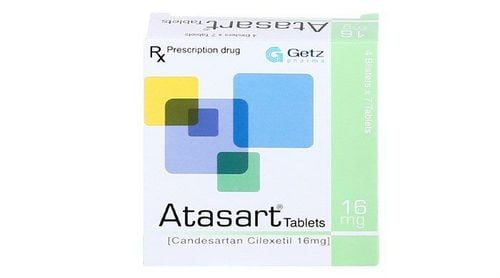This is an automatically translated article.
Enamigal medicine 5mg with the main ingredient is Enalapril, used to treat high blood pressure and to treat heart failure.
1. Uses of the drug Enamigal 5mg
Enamigal is an antihypertensive drug belonging to the group of inhibitors of the angiotensin converting enzyme. Enalaprilat (metabolite of Enalapril after oral administration of Enalapril) has the effect of reducing blood pressure in people with normal blood pressure / people with hypertension, has a good effect on patients with congestive heart failure.Enamigal is indicated for use in the following cases:
Hypertension; Congestive heart failure, left ventricular dysfunction. Enamigal is contraindicated for use in the following cases:
Hypersensitivity to Enalapril or its components; Angioedema at the beginning of treatment, renal artery stenosis; Aortic valve stenosis, severe obstructive cardiomyopathy; Pre-existing hypotension; Women who are pregnant or planning to become pregnant; Do not combine Enamigal with products containing Aliskiren in patients with diabetes or renal failure (glomerular filtration rate less than 60ml/min/1.73m2)
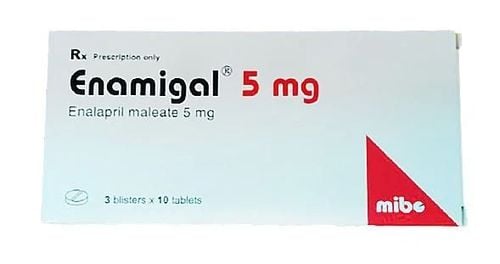
Enamigal 5mg được các bác sĩ sử dụng để điều trị cao huyết áp
2. How to use and dose Enamigal
How to use: Take the drug orally, regardless of the meal.
Dosage: Depends on age and pathology. Specifically as follows:
Dosage in adults:
Essential hypertension: Use a starting dose of 2.5 - 5mg/day, adjust the dose according to the patient's blood pressure response. The usual maintenance dose is 10-20mg/time/day. The maximum dose for adults is 40mg/day. If concomitant diuretic therapy is required, the diuretic should be discontinued if possible for 2 to 3 days prior to initiating ACE inhibitors, necessitating a very low initial dose (less than 5 mg/24 h). gradually increase the dose cautiously according to the patient's therapeutic response; Heart failure: Dosage in the first week is 2.5mg/time/day, for the first 3 days; then 2.5mg x 2 times/day for the next 4 days. Thereafter, the dose can be gradually increased to a maintenance dose of 20 mg/day, administered once or twice, morning and evening. In rare cases, the dose may be increased to 40 mg/day, titrated over 2-4 weeks. If the patient has severe heart failure (grade 4), impaired kidney function, and electrolyte abnormalities, it is necessary to carefully monitor health at the hospital right from the start of Enamigal. This principle also applies when co-administering Enamigal with vasodilators; Asymptomatic left ventricular dysfunction: The initial dose is 2.5 mg x 2 times/day, administered in the morning and evening, continuously adjusted to the appropriate level to a dose of 20 mg/24 hours, divided Use twice in the morning and at night. Blood pressure and renal function should be closely monitored before/after starting treatment to avoid the risk of severe hypotension and renal failure. If possible, the diuretic dose should be reduced before starting Enamigal. At the same time, the patient's serum potassium should be monitored, adjusted to normal. Dosage in children:
The safety and effectiveness of Enamigal in the treatment of hypertension in children over 6 years of age is limited, so it should be used with caution. The use of Enamigal is not recommended in neonates and children with glomerular filtration rate less than 30ml/min/1.73m2; Treatment of hypertension: For children who are able to swallow, the dose of Enamigal depends on the child's blood pressure. The starting dose is 2.5 mg for children weighing 20 - less than 50 kg and 5 mg in children weighing 50 kg or more, used once a day. Dosage can be adjusted according to the needs of the patient according to the doctor's prescription. Dosage in patients with renal impairment:
It is necessary to reduce the dose or prolong the interval between doses. Enamigal is eliminated by hemodialysis. On non-dialysis days, the dose can be adjusted according to blood pressure. Dosage is as follows:
Creatinine clearance 30 - 80 ml/min: Initial dose 5 - 10 mg/day; Creatinine clearance 10 - 30ml/min: Initial dose 2.5mg/day; Creatinine clearance 10ml/min: Initial dose 2.5mg/day on day of dialysis. Patients with renal impairment require special dose adjustment if treatment is combined with other antihypertensive drugs. Within 4 weeks of taking the drug, if the therapeutic effect is not achieved, the dose should be increased or other antihypertensive drugs should be considered.
Overdose: Symptoms include: Low blood pressure, severe headache, heart palpitations, facial flushing, ... or Methemoglobinemia occurs. The treatment is to put the patient in a lying position, raise the legs, give intravenous fluids; treat cyanosis caused by methemoglobinemia by slow intravenous injection of methylene blue 1 - 2mg/kg; gastric lavage immediately.
Missed dose: When a dose of Enamigal is forgotten, the patient should take it as soon as possible. However, if it is almost time for your next dose, you should skip the missed dose and take your next dose at the scheduled time.

Người bệnh nên sử dụng thuốc Enamigal 5mg theo đúng chỉ định của bác sĩ
3. Side effects when using Enamigal
Some side effects when using Enamigal include:
Blood and lymphatic system: Anemia, neutropenia, thrombocytopenia, hemoglobin, hematocrit, granulocytopenia, bone marrow failure, lymphadenopathy, autoimmune disease exempt; Nervous: Headache, depression, somnolence, confusion, insomnia, nervousness, dizziness, paresthesia, sleep disturbance; Respiratory, thoracic and mediastinal: Cough, dyspnea, rhinorrhea, hoarseness, sore throat, tracheospasm/asthma, pulmonary infiltrates, alveolitis, rhinitis, eosinophilic pneumonia; Eyes: Blurred vision; Cardiovascular: Dizziness, hypotension, arrhythmia, angina, tachycardia, myocardial infarction, cerebrovascular accident, Raynaud's syndrome; Hepatobiliary: Liver failure, hepatitis, obstructive jaundice, necrotizing hepatitis; Gastrointestinal: Nausea, abdominal pain, diarrhea, taste changes, intestinal obstruction, vomiting, pancreatitis, constipation, dyspepsia, loss of appetite, digestive irritation, peptic ulcer, dry mouth, stomatitis, glossitis, intestinal angioedema; Skin and subcutaneous tissue: Rash, edema (face, lips, tongue, larynx, glottis, extremities), erythema multiforme, exfoliative dermatitis, Stevens-Johnson syndrome, pemphigus, epidermal necrolysis poisoned; Reproductive: Impotence, enlarged breasts in men; Urology: Renal dysfunction, proteinuria, renal failure, oliguria; Other side effects: Asthenia, hypoglycemia, fatigue, hot flushes, muscle spasms, tinnitus, malaise, fever; Laboratory tests: Increased serum creatinine, hyperkalemia, uremia, hyponatremia, increased liver enzymes, increased serum bilirubin,...
4. Be careful when using Enamigal
Users should note when using Enamigal:
Renin - ANgiotensin - Aldosteron dual leprosy: Do not use ACE inhibitors, Aliskiren, Angiotensin II receptor antagonists at the same time because it increases the risk of hypotension. , impaired renal function, hyperkalemia; The risk of hypotension is more likely to occur in volume-depleted patients (using diuretics, dialysis, vomiting, diarrhea, and a strict salt-restricted diet), patients with heart failure without renal failure, or anemia. local heart disease, cerebrovascular disease, aortic or mitral stenosis, people with impaired kidney function; Increased risk of hypotension and renal failure in patients with renal artery stenosis. For patients with suspected renal artery stenosis, it is necessary to measure blood creatinine before starting Enamigal; Do not use Enamigal in new kidney transplant patients; The drug can cause hepatitis or obstructive jaundice, then progress to liver necrosis, which can lead to liver failure, death; Discontinue use of Enamigal if jaundice or elevated liver enzymes occur; If ACE inhibitors are used, patients may experience agranulocytosis, thrombocytopenia, anemia; Use Enamigal with caution when treating with immunosuppressants, procainamide, allopurinol or in combination with other complicating factors (especially in patients with impaired renal function); Angioedema: Edema of the face, lips, tongue, glottis, larynx, and extremities may occur in patients receiving Enamigal. Use with caution in patients with a history of idiopathic or hereditary angioedema; If an anaphylactic reaction occurs, Enamigal should be discontinued; Diabetics using insulin or oral medications should be warned about the risk of hypoglycaemia when using Enamigal, especially during the first month of concomitant use of these drugs; Using Enamigal may cause a persistent dry cough; The drug can lower blood pressure in patients undergoing surgery or using other anesthetic agents; Drugs that increase serum potassium levels in patients with renal failure, diabetes, people over 70 years of age, metabolic acidosis, acute cardiac decompensation, concomitant use of potassium-sparing diuretics, use of additional drugs potassium or drugs that increase serum potassium levels; Do not use Enamigal with Lithium simultaneously; Enamigal contains lactose, not for use in patients with hereditary disorders of galactose intolerance, glucose/galactose malabsorption, Lapp Lactase deficiency; Enamigal drugs can cause dizziness, dizziness, blurred vision in some patients, so when this symptom occurs, it is necessary to avoid driving, working at height, operating machinery; Enamigal may negatively affect the health of an unborn baby and nursing infant. Therefore, it is best not to take the drug during pregnancy and lactation.

Enamigal 5mg cần được dùng theo chỉ định của bác sĩ sau khi thăm khám
5. Enamigal drug interactions
Some Enamigal drug interactions include:
Other vasodilators or anesthetics: May cause severe hypotension; Diuretics may cause excessive hypotension after treatment with Enamigal; Renin-releasing drugs such as diuretics enhance the antihypertensive effect of Enamigal; Drugs that increase serum potassium when used with Enamigal may cause an increase in serum potassium, especially in patients with renal impairment; Taking Enamigal with Lithium can increase blood lithium levels, leading to lithium toxicity; Nonsteroidal anti-inflammatory drugs and sympathomimetic bronchodilators may reduce the antihypertensive effect of Enamigal; Contraceptives when used with Enamigal increase the risk of damage to the blood vessels, making it difficult to control blood pressure. Enamigal belongs to the group of cardiovascular drugs with indicated doses depending on age and disease status. Patients need to absolutely adhere to the dose prescribed by the doctor to ensure the effectiveness of treatment, to avoid the risk of unpredictable side effects.
Please dial HOTLINE for more information or register for an appointment HERE. Download MyVinmec app to make appointments faster and to manage your bookings easily.





